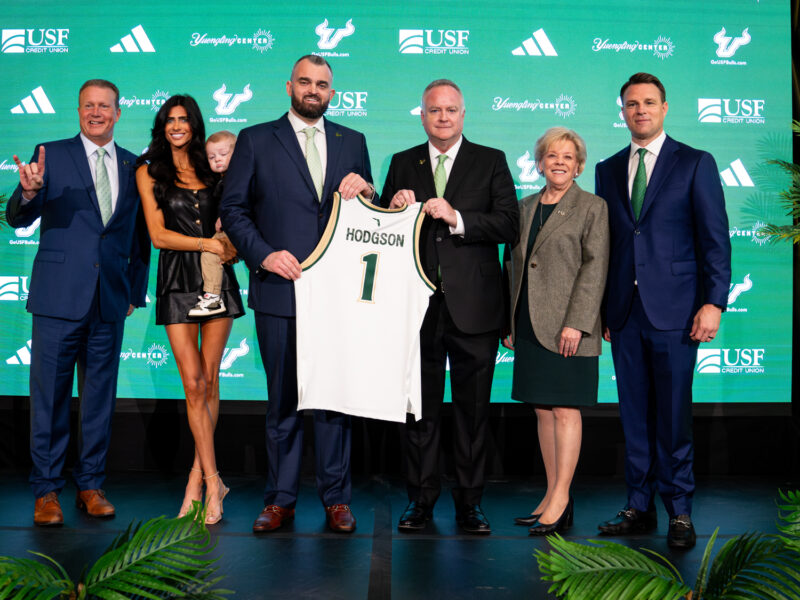Above photo: When USF system President Judy Genshaft gave a video pep talk to the university community on Jan. 18, she had not yet come out in favor of the proposal to consolidate the three campuses under Tampa’s control. Courtesy of USF
By Nancy McCann
When Regional Chancellor Sophia Wisniewska was ousted last fall, the USF administration in Tampa promptly provided key public records requested by The Crow’s Nest.
The draft of a termination letter from USF system President Judy Genshaft to Wisniewska and the voluntary resignation agreement that followed were provided to The Crow’s Nest in one day.
Other documents, like Wisniewska’s personnel file, were released within 24 days.
The administration’s response was much slower, however, when the newspaper sought records on the controversial legislation that ended the separate accreditations of the St. Petersburg and Sarasota-Manatee campuses and put both under Tampa.
Although The Crow’s Nest filed a request for a variety of records on Jan. 28, the administration did not comply until March 9 – 40 days after the request and one day after a media lawyer representing a Crow’s Nest reporter wrote to the university complaining about the delay.
(On Feb. 23, the administration had provided a single letter that had already been released to the public.)
The pokey pace of the administration’s response to The Crow’s Nest is consistent with a strategy in which administrators carefully managed their public position on the proposal while many in St. Petersburg reeled in surprise and anger and Genshaft shifted her stance from neutral to supportive.
News of the proposal became public on Jan. 16, when The Crow’s Nest and Tampa Bay Times reported that it was in the last two pages of a 52-page bill on higher education in the Florida House of Representatives.
The proposal landed like a bombshell on the St. Petersburg campus, which has thrived since earning separate accreditation in 2006 after decades under the thumb of Tampa administrators.
The listed sponsor of the proposal, Rep. Ray Rodrigues of Estero in Lee County, claimed credit for the idea, and university officials said Genshaft – like administrators and senior faculty in St. Petersburg – was caught off guard. She pledged to be neutral on the bill and carry out whatever lawmakers enacted.
It quickly became clear, however, that the champion of the bill was Rep. Chris Sprowls, R-Palm Harbor – not Rodrigues – and that Genshaft had been alerted in October that the proposal was under consideration.
In an editorial, the Times later chided her for her “initial lack of candor.”
When Genshaft became a supporter of the proposal, it picked up momentum. The Florida Board of Governors, the body that oversees all the state’s public universities, cited her buy-in when it unanimously endorsed the House bill on Jan. 25.
In the weeks that followed, a loose coalition backing the St. Petersburg campus – senior and retired faculty and administrators, most Pinellas County elected officials, and leading Pinellas-based business groups – denounced the plan and urged legislators to defeat it or at least postpone action for a year until the issue could be studied.
‘Respond in good faith’
Shortly after news of the proposal broke, The Crow’s Nest made its records request under Florida’s sweeping, 109-year-old Public Records Law, which gives the public and press the right to review a vast array of government documents.
The law also requires public records custodians to “acknowledge requests promptly and to respond in good faith,” according to the state’s First Amendment Foundation, a nonprofit organization that advocates openness in government.
If decisions are made by telephone or in meetings without written documentation, however, nothing in the law requires public officials to answer questions about details of the conversations.
In its Jan. 28 request, the newspaper asked the USF administration for all emails, letters and text messages to and from Genshaft and her chief of staff, Cindy Visot, starting Nov. 15, that were related to the proposed legislation and accreditation.
It also asked for any written communication between the two USF leaders and Reps. Rodrigues and Sprowls on any subject.
The Crow’s Nest made similar public records requests to the Legislature, asking for documents to and from Rodrigues, Sprowls and Sen. Jeff Brandes, R-St. Petersburg, a champion of the consolidation proposal in the Senate.
The USF administration charged the newspaper $66.86 to search its records and another $142.37 for someone to read the documents and redact anything that was exempt from disclosure under the law.
The Legislature charged nothing for the same tasks.
The records that were released by the Legislature and – belatedly – by USF show that Genshaft, Visot and the key legislators did not put anything in writing until just before the controversial proposal became public.
In fact, the records show that Genshaft communicated on the issue in writing just a few times.
But the records also show that the wheels were turning in her office.
On Jan. 12, four days before news of the legislative proposal broke, Mark Walsh, the USF system’s assistant vice president for government relations, emailed Visot and three other administration officials.
“The language that we heard would be proposed in it (the higher education bill) regarding consolidation of the USF System accreditation is found in Sections 23 and 24 near the very end of the bill,” Walsh wrote.
That same day Karen Holbrook, who was appointed regional chancellor of the Sarasota-Manatee campus by Genshaft one month earlier, began exchanging emails with Visot.
“What is the plan for informing the BOT (USF system Board of Trustees) and the regional campus boards” of Sarasota-Manatee and St. Petersburg? Holbrook asked.
“Mark (Walsh) is drafting something for me to send out,” replied Visot.
“Good,” wrote Holbrook. “Once that is done, I would like to get together with Byron. He may need some calming!”
Byron is apparently Byron Shinn, chairman of the Sarasota-Manatee Campus Board.
Minutes later, Holbrook wrote to seek Visot’s counsel on what she should say at a campus town hall and strategic planning meeting later in the week.
“I would raise this to reassure everyone that we will be fine and could/should see this (the legislative proposal) as a positive, but don’t want to get out ahead of Judy (Genshaft),” Holbrook wrote.
Managing Tadlock’s message
The records show that Martin Tadlock, whom Genshaft appointed acting regional chancellor in St. Petersburg after forcing out Wisniewska, was also checking with Tampa for instructions on what to tell his campus and when.
Walsh, Visot and university spokeswoman Lara Wade all weighed in on what Tadlock should tell his stunned campus.
On Jan. 16, Tadlock emailed Wade and Visot to ask them to review a short statement he proposed to distribute, along with a university release that Wade had already sent to the Times and Crow’s Nest.
“Is this language ok to send to the USFSP campus?” Tadlock asked.
In his proposed statement, Tadlock vowed that the St. Petersburg campus would continue to serve its students, faculty and residents of the region “regardless of the shifting landscape of higher education today.”
He also proposed to pledge that “We will continue to move forward on all initiatives as planned because we are the public university for Pinellas County and our work is important to the future of this area.”
But Tadlock’s proposed language was not OK in Tampa.
Walsh wrote that he did not like the way Tadlock referred to USF St. Petersburg’s role in Pinellas County.
“Isn’t he planning a meeting with his faculty?” Walsh wrote to Visot. “It might be better to just say, ‘we are aware of this proposed legislation and invite you to a meeting on _____ to discuss it.’
“Then if he wants to say, ‘in the meantime, we will be moving forward with all current initiatives’ or something re business as usual, that’s fine I guess. I wouldn’t get into the county turf war stuff and who does what for where.”
Administrators in Tampa also decided that Tadlock should not distribute the press release to people on the St. Petersburg campus.
“Martin, please do not send the press release,” Visot wrote.
At about the same time, records show, the chairman of the USF system Board of Trustees emailed Visot with some public relations instructions of his own.
Visot had shared the press release with the chairman, Brian Lamb, to keep him “in the loop.”
“Thank you,” Lamb replied. “I would like to see any more communications prior to them going out on this topic. I just got off the phone with key leaders in Florida related to this topic and we must be aligned in our comments.”
‘Pettiness or personal agenda’
Meanwhile, as a jolted St. Petersburg campus tried to assess the news, Visot sought the advice of Kimberly Wilmath Hill, a former Times reporter who is now communications director for a private Tampa Bay company.
Hill worked in USF’s communications and marketing office in 2013-2016 and served as liaison among the three USF system campuses.
“To me, encouraging people to look to the news for the truth about this issue is the wrong message,” Hill wrote in an email to Visot on Jan. 18. “We need to be in charge of the message. And laying out all the nuts and bolts of the political process basically tells the story of ‘we are not in control of our destiny.’ “
In another email that day, Hill said the message should be that “We value unity because it helps us do what we are set out to do.”
She advised that “the ultimate high road” for the administration on the issue would be taking a “nobler stance … not unity for its own sake or because a piece of paper tells us we are unified.
“And hopefully the subtext is anyone who thinks otherwise is clearly not being driven by that higher cause but rather by their own pettiness or personal agenda.”
Records show, however, that Joe Hice, the university system’s chief marketing officer, disagreed with some of Hill’s advice and wanted Genshaft and her administration to be neutral on the proposal.
Yet within a week Genshaft abandoned her neutrality and sent an email to USF leaders on Jan. 23 touting “the potential for significant benefits” to students and all three campuses.
That led to the endorsement by the Florida Board of Governors.
The Legislature passed the measure on March 5, and Gov. Rick Scott signed it into law six days later.



